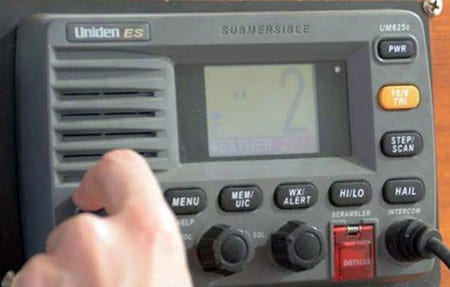 By Bob Currie, Vessel Examiner
By Bob Currie, Vessel Examiner
United States Coast Guard Auxiliary Station Galveston Flotilla
The Saturday Night Live character Roseanne Rosannadanna had a saying: “It just goes to show you, it’s always something.” What now, you ask? It turns out that the U.S. Coast Guard has received reports from crews, ship owners, inspectors and other mariners regarding poor reception on VHF frequencies used for radiotelephone, digital selective calling (DSC) and automatic identification systems (AIS) when in the vicinity of light emitting diode (LED) lighting on-board ships (e.g., navigation lights, searchlights and floodlights, interior and exterior lights, adornment). For example, my navigation lights are LED lights.
The Station Galveston Flotilla of the US Coast Guard Auxiliary operates out of the USCG Station Galveston base on Galveston Island. They provide assistance to the Coast Guard by providing maritime observation patrols in Galveston Bay; by providing recreational boating vessel safety checks; and by working alongside Coast Guard members in maritime accident investigation, small boat training, watch standing, and property administration.
Radio frequency interference caused by these LED lamps was found to create potential safety hazards. For example, the maritime rescue coordination center in one port was unable to contact a ship involved in a traffic separation scheme incident by VHF radio. That ship also experienced very poor AIS reception. Other ships in different ports have experienced degradation of the VHF receivers, including AIS, caused by their LED navigation lights. LED lighting installed near VHF antennas has also shown to compound the reception.
Strong radio interference from LED sources may not be immediately evident to maritime radio users. Nonetheless, it may be possible to test for the presence of LED interference by using the following procedures:

- Turn off all LED lights.
- Tune the VHF radio to a quiet channel such as Channel 2.
- Adjust the VHF radio’s squelch control until the radio outputs audio noise.
- Re-adjust the VHF radio’s squelch control until the audio noise is quiet, only slightly above the noise threshold.
- Turn on the LED lights. If the radio now outputs audio noise, then the LED lights have raised the noise floor. (Noise floor is generally the amount of interfering signals / static received beyond the specific signal or channel being monitored.)
- If the radio does not output audio noise, then the LED lights have not raised the noise floor.
If the noise floor is found to have been raised, then it is likely that both shipboard VHF marine radio and AIS reception are being degraded by LED lighting. In order to determine the full impact of this interference, the Coast Guard requests those experiencing this problem to report their experiences to Coast Guard Navigation Center: https://www.navcen.uscg.gov
Select “Maritime Telecommunications” on the subject drop down list, then briefly describe the make and model of LED lighting and radios effected, distance from lighting to antennas and radios effected, and any other information that may help understand the scope of the problem.
Summary
The Coast Guard has identified a problem of interference by some LED lights with some VHF marine radios. They ask that you test your own system and report any interference to them in order to help them come up with a solution. In the meantime, if you do find interference between your LED lights and your marine radio, keep that in mind, especially when you are near high traffic areas such as the Houston Ship Channel or the Intracoastal Waterway.
For more information on boating safety, please visit the Official Website of the U.S. Coast Guard’s Boating Safety Division at www.uscgboating.org. Questions about the US Coast Guard Auxiliary or our free Vessel Safety Check program may be directed to me at [email protected]. I am available to perform free Vessel Safety Checks, and I will come to your location to perform them. SAFE BOATING!
[2-18-2019]

 Posted in
Posted in 
























